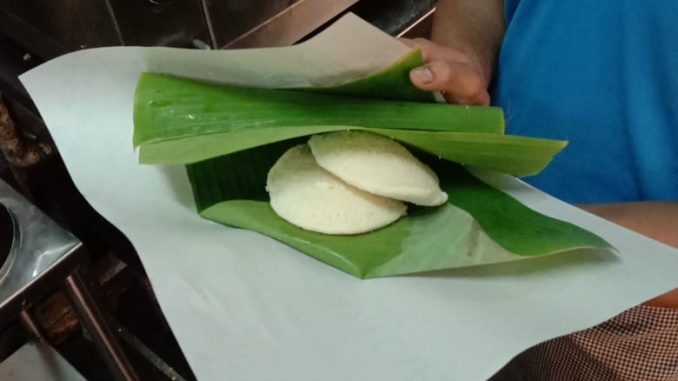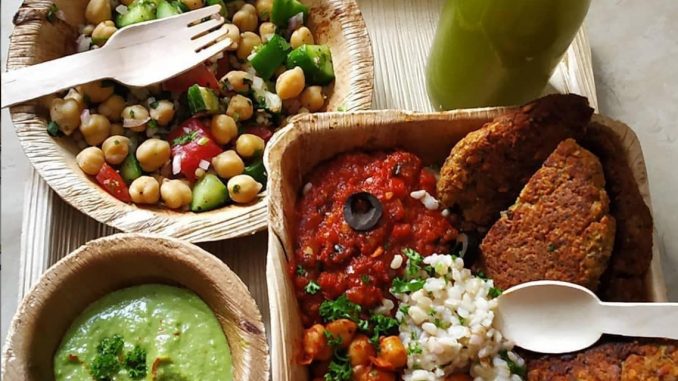Everyone has a role to play in reducing the amount of waste Bengaluru generates. But when bigger entities like businesses commit themselves to the cause, the impact may be greater.
Take Bengaluru’s teenage-led initiative to reduce water use in restaurants. Garvita Gulhati, a 19-year-old student, had started the ‘Why Waste?’ campaign in July 2015, calling on restaurants to only half-fill water glasses and to ask customers if they needed water at all. The campaign has reached out to over one lakh restaurants by partnering with organisations like the National Restaurant Association of India. ‘Why Waste?’ estimates they’ve saved two lakh litres of water so far.
In March 2016, plastic was officially banned in Karnataka. But BBMP has not been enforcing the ban strictly, and many restaurants have been flouting rules.
However, many others have complied with the ban. Some of these businesses also understand the bigger picture – that they will be better off in the long run by leaving a smaller environmental impact. Here are six restaurants/food outlets that have devised new ways to reduce waste.
- Corner House is encouraging customers to BYOB
Last month, Corner House ice cream chain launched a campaign across all its stores to encourage customers to BYOB – Bring Your Own Bowl. To promote this initiative, Corner House has promised to donate Rs 10 to charity, for every order where the customer has brought his/her own bowl. In July, the chain is donating to CUPA (Compassion Unlimited Plus Action), an animal care centre and shelter. A month since starting the campaign, the company says they’ve seen it catch on, and hopes that it continues to grow.
- Vinaya Cafe uses banana leaves and paper to package takeaway food
This local cafe chain has greatly reduced plastic use by changing the way they package takeaway food. They now wrap takeaway in banana leaves and paper at their five locations. Rajesh Ka, Head of Operations at the chain, explains that the practice is not only environment-friendly, but is also healthier for the consumer. Though the cafe still uses plastic containers for sauces and curries, they charge extra for this, hoping it would encourage customers to either reuse the containers or to bring their own.

Vinaya Cafe started using banana leaves and paper after the city’s plastic ban. Pic: Rajesh Ka
- ‘Eat Raja’ serves juice in hollowed-out fruits instead of cups
This juice stand in Malleshwaram has been around for over four decades. After taking over the business from his father, Anand Raj—better known as R J Raaj—sought to reduce the waste generated here. Last year, he met his goal of making the business zero-waste.
Raj has gotten rid of plastic straws and cups, and even paper cups. Instead, ‘Eat Raja’ serves its juice in hollowed-out fruit. Here, watermelon juice is served in a watermelon, and pineapple juice in a pineapple. The innards of the fruit is used to make the juice, and the outer layer is used as the cup. Raj later feeds the ‘cups’ to his cows. Other juices offered here are served in glasses. With these practices, Raja estimates that he avoids buying 12,000 disposable cups a year, thus also saving around Rs 10,000.
- JustBe Cafe uses eco-friendly utensils, including metal straws
As a plant-based cafe, JustBe, located in Sadashivanagar, is environmentally astute. The cafe uses packaging made of bagasse for takeaway orders, reduces water use by serving it only on request, and has only reusable cutlery. Their straws are metal, and their takeaway cutlery is made of wood. They are currently working on ways to compost waste.
- Koshy’s is following the lead of ‘Why Waste?’
The famed Koshy’s has taken a cue from the ‘Why Waste?’ campaign to reduce water consumption; they only half-fill water glasses now. They have also started recycling the water that they use to rinse rice. Rather than discarding this water, they use it in the first rinse cycle of dishwashing.

PurpleBasil is a Bengaluru-based food delivery and subscription service aimed at promoting healthy eating. Pic: Rolvin Castelino
- PurpleBasil doesn’t add anything to their menu that can’t be packaged in an eco-friendly manner
Popular food delivery service apps like Swiggy and Zomato have struggled to cut down their plastic use. But PurpleBasil, an online meal delivery and subscription service, has been thinking about it from the start. CEO Dhananjai Raja Kuttikad explains that they pack food only in dishes made of Areca leaves, which are biodegradable and compostable. Also, their cutlery is made of wood, but they do not provide it to customers by default. Customers who want cutlery must select this option while ordering online; however they are not charged extra for this.